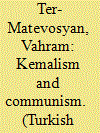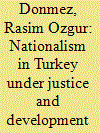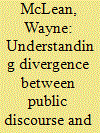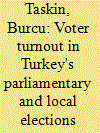|
|
|
Sort Order |
|
|
|
Items / Page
|
|
|
|
|
|
|
| Srl | Item |
| 1 |
ID:
142295


|
|
|
|
|
| Summary/Abstract |
Every state tries to regulate, control and determine who may enter into its territory. Undesirable foreigners become subjects of bordering processes of states. By confining itself to the period between 1990 and 2010, this study explores the aims and guidelines of Turkey's Border Policy for the movement of foreigners; its borders against mobility and the reasons and the subjects of bordering processes: why and whom the borders are aimed to prevent or filter. As the findings present, Turkey's bordering processes against the movement of foreigners have been justified by arguments on security, about protecting the state's territorial integrity, as well as general public morality and the familial structure. The paper reveals that bordering processes targeted three main groups of foreigners: those who supported the PKK (Partiya Karkaren Kurdistan – Kurdistan Workers' Party) and criticized Turkey's actions and policy against it; non-Muslim and non-Turkic poor women; and Iranian, Iraqi and Syrian nationals with Kurdish origin.
|
|
|
|
|
|
|
|
|
|
|
|
|
|
|
|
| 2 |
ID:
142294


|
|
|
|
|
| Summary/Abstract |
Although scholars have examined different aspects of bilateral relations between Turkey and the Soviet Union, many aspects of the relationship remain to be studied and contextualized. This article examines how the Kemalist transformation in Turkey and particularly the ideology of Kemalism were seen and interpreted by Soviet actors between the 1920s and 1960s. Initially viewed as an ally in the struggle against the West, Kemalism was later treated mainly negatively by the Communist regime. However in the 1960s, with the rise of leftist politics in Turkey, the Soviets revisited Kemalism with more favorable interpretations. Looking at these shifts through the lenses of Soviet diplomats, Communist party functionaries, and scholars helps us to understand the underlying dynamics.
|
|
|
|
|
|
|
|
|
|
|
|
|
|
|
|
| 3 |
ID:
142296


|
|
|
|
|
| Summary/Abstract |
This study analyzes how the Justice and Development Party's (AKP) understanding of new nationalism, or neo-Ottomanism, incorporates the logic of masculinist protection in its discourse. This necessitates a security-oriented state that firmly connects domestic politics with foreign policy. The concept of the logic of masculinist protection, borrowed from Iris Morrison Young, refers to the reinforcement of a gender hierarchy in politics, and signifies a paternalistic state charged with protecting a society identified with femininity.
|
|
|
|
|
|
|
|
|
|
|
|
|
|
|
|
| 4 |
ID:
142293


|
|
|
|
|
| Summary/Abstract |
The academic literature on negative campaigning is growing. As an attempt to contribute to the theoretical and empirical knowledge on the phenomena, this study focuses on the Turkish elections and tries to provide answers to the following research questions: What is the level of negativity in Turkish electoral campaigns and which factors are salient for going negative for Turkish political parties? Findings display the fact that negativity is noticeably high in Turkey, and incumbency, ideology and time focus of messages are salient factors for negativity.
|
|
|
|
|
|
|
|
|
|
|
|
|
|
|
|
| 5 |
ID:
142298


|
|
|
|
|
| Summary/Abstract |
This study examines the struggle over regulation in the Turkish tobacco market from 1938 to 1960 based on a variety of primary sources. The extensive intervention through the state monopoly was incapable of eliminating severe conflicts among market actors, which triggered heated public debates on regulation. As a solution, tobacco experts proposed establishing cooperatives, exchange markets, and a bank. For this purpose, Turkish governments imposed a compulsory levy on tobacco producers for eleven years. Despite years-long discussions, many legislative attempts, and a significant fund collected from producers, the projected institutions were never established. The failure of institutional reform shows the limits of state intervention even in a seemingly heavily regulated crop market, and the policy-shaping impacts of social actors other than the state. This article contributes to the modern Turkish historiography by revealing the specific power configuration between the state and contending groups, instead of taking omnipotence of the state for granted.
|
|
|
|
|
|
|
|
|
|
|
|
|
|
|
|
| 6 |
ID:
142297


|
|
|
|
|
| Summary/Abstract |
While various studies suggest that anti-Semitism is almost non-existent in Turkish society, the popularity of the conspiratorial rhetoric about Jews raises question marks about this view. This article probes into contemporary anti-Semitism in Turkey by scrutinizing conspiracy theories about a crypto-Judaic society called Dönme. It explores the influence of the paranoid style in Turkish politics, known as the Sèvres syndrome, on the popular conspiracy theories with anti-Semitic themes. The research relies on an analysis of the content of conspiracy accounts and interviews with their authors. It concludes that the influence of the Sèvres syndrome is imperative to understand the rationale of anti-Semitic conspiracy rhetoric in Turkey.
|
|
|
|
|
|
|
|
|
|
|
|
|
|
|
|
| 7 |
ID:
142291


|
|
|
|
|
| Summary/Abstract |
This article explores the divergence between public discourse and Turkish foreign policy practice in the context of Turkey's regional pressures. It argues that divergence occurs because elites rearrange the hierarchy of domestic ideas that connect with foreign policy. This allows them to respond to regional threats appropriately, without undue interference from domestic political forces. Thus, to achieve optimal strategic outcomes, Turkish elites use emotive language around topics less likely to impact the immediate security, such as the USA and Israel, while deemphasizing higher order issues, such as Syria and Iran, which do have considerable security implications.
|
|
|
|
|
|
|
|
|
|
|
|
|
|
|
|
| 8 |
ID:
142292


|
|
|
|
|
| Summary/Abstract |
This study evaluates the influence of party competitiveness, number of parties and intervention of non-elected actors, as well as socio-economic and institutional factors, with respect to voter turnout in Turkish parliamentary and local elections. While statistical results contradicted expectations, the application of compulsory voting proved to be the single most important determinant for an increase in voter turnout, whereas electoral type and electoral system difference become insignificant for electoral participation motivation. The first democratic elections following a military intervention generally shows a significant jump in voter turnout, but it also causes a decrease in the number of parties and diminishes party competition for the following electoral terms. Large numbers of registered voters and high voter turnout motivate parties to compete in the elections. Nevertheless, lack of party competition and a 10 percent electoral threshold enable only a few parties to take a piece of this enormous electoral pie.
|
|
|
|
|
|
|
|
|
|
|
|
|
|
|
|
| 9 |
ID:
142299


|
|
|
|
|
| Summary/Abstract |
Turkey has historically struggled to attract foreign investors. This paper discusses how the start of the European Union's accession negotiations in 2005 encompassed a wide set of reforms in several chapters of the acquis communautaire that resulted in higher foreign direct investment (FDI) attraction. However, it seems that the global economic slowdown of 2009 coupled with increasing Euro-skepticism have already started to erode this effect. Only large a volume of foreign investment in the energy sector observed in 2009–13, explained by the energy security strategy of the European Union and the internal liberalization agenda, has prevented the collapse of FDI inflows to Turkey.
|
|
|
|
|
|
|
|
|
|
|
|
|
|
|
|
|
|
|
|
|